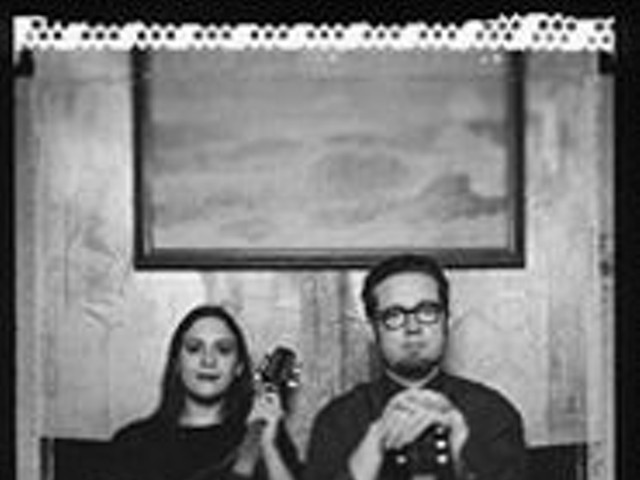"We're just getting together at this point," he says of the new lineup, the latest Oldani entourage. The upcoming Starnineteen album brings together recordings made as long as two years ago, with various musicians like drummers Dennis Stringfield, Greg Miller (formerly of Pale Divine) and Gota Yashiki ("the funky monk") and guitarists Tom Brammer and Wilbur Amelung. The current live version of Starnineteen features guitarist Jimmy Hotts and bassist Job Suriyakhm. (The drummer situation is up in the air.) According to Oldani, Starnineteen have more than enough songs written, so now they're focused on player cohesion. "We're not recording things when we're practicing," he reveals. "We don't have a tape going during rehearsal. They're like great riffs we're never going to remember. Our problem is that we're just getting together at this point, and the songs are going out the window."
Apparently some have climbed back in. The new CD (currently untitled, though Oldani half-jokes about calling it Stargasm) opens with "Manchester Road," a tune with just enough instrumental traffic to keep things moving. By exploiting a titular allusion, Oldani brightens the late dance-rock of Manchester, England, with a coat of local color. Most striking about Oldani's music is the way it evades the category rut. His vocals have an early-'80s Liverpool feel -- bands like Echo and the Bunnymen, like Icicle Works, are evoked -- in the way they can go from a whisper to a scream in one passionate leap. The end product is dance-rock with pop hooks and a grabby beat. And except for the drummer situation, Oldani is more than ready to play -- and grab his share of fans.
Just as quickly as Oldani announces an upcoming gig, though, he becomes bummed by his drummer problem. An upcoming live radio broadcast by the Point on Feb. 27 is "kind of like lighting a fire under my ass -- to find a drummer to play with immediately, because we have that gig. And I'm doing a show on March 11 at the Firehouse."
Ultimately every artist is his or her own salesman, and Oldani proves that hype can live up to itself. He musses up the line between promotion and music, in the process revealing that the two have always been in bed -- with promotion usually on top. But instead of letting the promotional angle fuck the music until it can't stand on its own, Oldani has taken charge. With his blend of disciplelike reverence and it's-all-a-joke cynicism, Oldani walks the fine line between serious aspiration and rock blasphemy. There's a conceptual streak in this snappy pitchman who also goes by the moniker Calvin Flash. One gets the feeling that music is just one stud on the jacket of his talent. "I've performed all my life," Oldani says. "Not always music, but I've always been a performer." Indeed, Oldani comes off as the kind of guy who, as a kid, probably sang, danced and juggled for his parents' friends.
In recent years he's done some local television commercials and such, but he prefers to not dwell on the small stuff. Still, the brushes with showbiz have groomed his sense of visual expression. In fact, Oldani thinks rock & roll should be a sight for sore eyes. "It would feel pretty righteous playing in a pair of Versace leather pants or something like that. Fashion is just as much a part of rock & roll (as anything else), especially in this day and age." His fashion ideas, though, have more in common with the Who's spectacular Tommy than the despicable Tommy Hilfiger.
"I'm trying to grow as a musician," he confides, "and, in the last few years, especially as a rock & roll performer." Performance anxiety aside, Oldani finds the Firehouse a seductive siren." It's a great venue," he opines. "I played there a couple of years ago when it first opened -- played there three or four times -- and it was cool, man, a really great place to perform. The stage was huge. It had a massive drum riser; the drum riser came up to my bellybutton." He thinks the Firehouse could help extinguish the flames of scene apathy. "I know they're getting a lot more local stuff," Oldani says. And what of the so-called scene? He flashes back to the major-label virginity of an era when playing around town was for fun, not career procreation "If Pale Divine was playing down at Kennedy's," Oldani reminisces, "people went. That was the thing to do." And though he doesn't feel that the death of Kennedy's was part of a conspiracy against local music, Oldani's creative sleuthing found the missing link (at least missing in St. Louis) between conceptual theatrics and honest songwriting. Not rock theater or a hollow, asinine sendup -- rather, pop music that springs, it would seem, from a healthy dream life.
Starnineteen speaks a language whose wavelength is one of ethereal rapture, miles away from the outgoing zip of Oldani's phone voice. And it's still rock & roll -- though it's tough to say whether Billy Joel would agree, because it's been given a brash sheen of modern angst. Either way, Oldani sees it all as a matter of musical survival. In the name of the almighty guitar, bass and drums, he makes a plea for us to not prey on our heritage. "Do we want to be the generation that makes rock & roll die?" he rallies. " Personally, I don't want to be part of the generation to see rock & roll die, so I'm going to do what I can." He means it. And that means good Samaritans can make great rock & roll.





